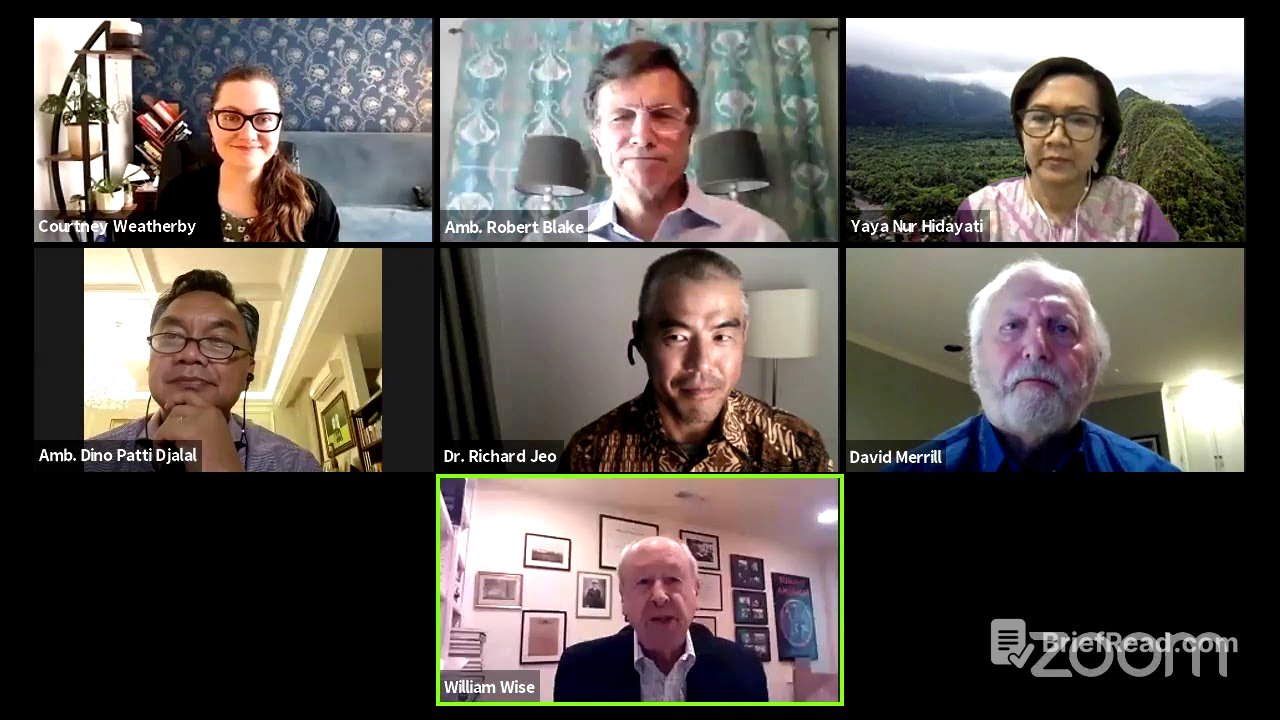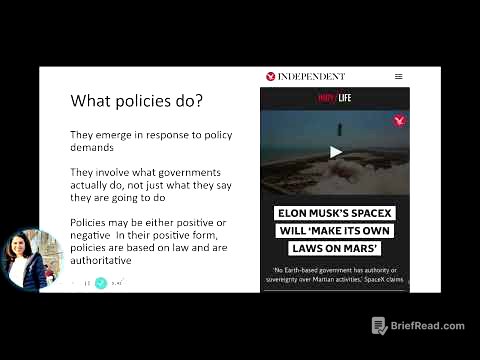TLDR;
This discussion, jointly hosted by the U.S. Indonesia Society and the Southeast Asia Forum program at the Stimson Center, addresses Indonesia's climate change challenges, progress, and future ambitions. Key points include:
- Indonesia faces significant climate change impacts due to its archipelagic nature and extensive coastline.
- While Indonesia has made strides in reducing deforestation, the energy sector's reliance on coal remains a major challenge.
- There's a growing push for more ambitious emissions reduction targets, with debates focusing on achieving net-zero emissions by 2050-2070.
- The discussion highlights the need for greater awareness among young people, stronger government leadership, and increased private sector involvement in climate finance and sustainable practices.
Introduction and Opening Remarks [0:00]
Courtney Weatherby from the Stimson Center introduces a discussion on Indonesia and climate change, highlighting Indonesia's vulnerability as an archipelagic nation with 42 million people living along coastlines. The discussion aims to address immediate and long-term challenges, encouraging audience participation through the Q&A function. Ambassador Robert Blake Jr., leading the Southeast Asia practice at McLarty Associates, is introduced as the moderator, bringing his extensive experience, including his tenure as U.S. Ambassador to Indonesia, to guide the panel.
Indonesia's Climate Change Efforts and Challenges [3:35]
Ambassador Robert Blake Jr. notes Indonesia's progress in reducing greenhouse gas emissions through decreased deforestation and increased renewable energy plans. Indonesia's current nationally determined contribution (NDC) aims to reduce emissions by 29% from its business-as-usual level by 2030, with a potential 41% reduction contingent on international assistance. The U.S. and other nations are encouraging Indonesia to increase its climate ambition, with private financing showing promise.
Indonesia's Climate Policy and Public Opinion [7:28]
Ambassador Dino Patti Djalal observes that climate issues have been a blind spot for the Indonesian government in recent years, with a primary focus on infrastructure and economic development, particularly increasing electricity targets reliant on coal. While the government raised the emission target from 26% to 29% at the Paris COP event, this target lacked a national program. The international environment, with countries like China and the U.S. setting net-zero targets, has renewed interest in climate issues in Indonesia. The environment minister's target of net-zero emissions by 2070 faced criticism from activists and NGOs, who advocate for a 2050 target to align with global carbon stock limits. A video campaign featuring celebrities calling for net-zero emissions by 2050 has influenced public opinion.
Government Initiatives and Deforestation Trends [11:00]
The Ministry for National Development has presented four scenarios for net-zero emissions, including targets for 2070, 2060, 2050, and 2045, for the President's decision. Minister Luhut has announced a target of 2060 or earlier and formed a task force with U.S. Special Envoy John Kerry for bilateral climate cooperation. PLN (Indonesia's state-owned electricity company) has also mentioned the possibility of achieving net-zero emissions by 2045. Deforestation rates in Indonesia have steadily declined since 2016, with data from Global Forest Watch and the Ministry for Environment and Forestry showing a similar trend.
Energy Transition and Future Targets [13:59]
Maintaining the declining trend of deforestation is not sustainable for reaching net-zero emissions or a 50% reduction by 2030. The portion of emissions from the energy sector is rising and will overtake emissions from deforestation and peatland issues. By 2022, emissions from energy and transportation sectors are predicted to be about 51%, reaching 59% by 2030, necessitating action on energy transitions. Phasing out coal and reforming the energy system are significant challenges due to strong political influence from the coal lobby.
Climate Crisis in Indonesia: Impacts and Emissions [16:54]
Ibuya Taufiqurrahman highlights that the climate crisis is already happening in Indonesia, evidenced by recent tropical cyclones and floods. These disasters are exacerbated by the loss of environmental carrying capacity. Indonesia is both a victim and a contributor to greenhouse gas emissions, with deforestation and the burning of fossil fuels being the major sources. In 2019, Indonesia emitted about 600 million tons of CO2.
Carbon Budget and Climate Justice [19:52]
According to calculations based on the IPCC's carbon budget report, Indonesia has a limited carbon budget to maintain a 66% probability of achieving a 1.5 degrees Celsius target, with only 14.8 gigatons remaining. At the current annual emission rate, Indonesia will exhaust its carbon budget in less than three years. The reduction of emissions is an obligation to Indonesian citizens, millions of whom become climate refugees each year due to climate-induced disasters.
Coal Production and Energy Transition Challenges [23:22]
Coal is a main source of energy in Indonesia, accounting for about 80% of the energy mix. Despite owning only 2.6% of the global coal deposit, Indonesia is a top exporter of coal. The government plans to increase coal production to almost 600 million tons, conflicting with commitments to reduce emissions. Energy transition faces challenges, including the political connections of the coal business and the myth of cheap coal, which does not account for externalities like pollution and health impacts.
Young Generation and Political Connections [26:05]
There is increasing criticism from the young generation regarding political connections in the government and business sector related to climate change. This rising awareness among young people is a potential force for action, urging the government to fulfill its obligations.
Finance, Conservation, and Climate in Indonesia [27:47]
Dr. Richard Geo emphasizes the importance of forests, peatlands, and mangroves in Indonesia for addressing the climate crisis. Nature provides over a third of the solution to climate change, offering more than 10 gigatons per year of potential emissions reductions or mitigation. Natural climate solutions are efficient and provide various returns, including biodiversity, fresh water production, and food security.
Ecosystems and Funding for Natural Climate Solutions [32:23]
Ecosystems have evolved over millions of years, and their destruction leads to the release of carbon that cannot be recovered in our lifetime, reducing the world's budget for preventing catastrophic warming. Despite nature being 37% of the climate change solution, it only receives 2% of the funding. Indonesia is the most important place in the world for natural climate solutions, with the most carbon in carbon-dense ecosystems like peatlands, mangroves, and tropical forests.
Carbon Markets and New Financial Instruments [34:29]
Markets are starting to recognize the reality of climate change, with compliance and voluntary carbon markets increasing. However, the voluntary global carbon market is still small, with estimates suggesting it could reach $200 billion by 2050. New instruments like the Restore Fund, announced by Apple, are focused on accelerating natural solutions to climate change. Governments are also investing in climate-related initiatives, such as Singapore's $2.38 billion commitment.
Blended Capital and Community Support [37:35]
Blended capital, combining bilateral or multilateral support with private sector investment, is essential for addressing the climate crisis. This funding can support communities living in and around critical ecosystems, providing alternative livelihoods and generating wealth through strategies like social forestry. Conservation efforts, such as training forest rangers and supporting social enterprises, are also effective climate change strategies.
Indonesia's Role on the World Stage [40:01]
Indonesia will be on the world stage, with a presidential regulation for carbon forthcoming and the G20 summit in Indonesia next year. The country is poised to lead in capitalizing on the extraordinary opportunity to address climate change.
Youth Awareness and Engagement [41:05]
Ambassador Dino Patti Djalal notes that young people are increasingly environmentally conscious, particularly regarding plastics, but need further awakening to climate issues. Connecting climate safety to Indonesia's centennial in 2045 is a strategy to raise awareness.
Capital Relocation to Kalimantan [43:47]
Ibuya Taufiqurrahman states that WALHI opposes the plan to move the capital to Kalimantan, as it will not solve Jakarta's overdevelopment issues but rather move the problem to Kalimantan, requiring more resources and infrastructure that will destroy forests.
Climate Finance Opportunities [47:06]
Dr. Richard Geo emphasizes the need to marry Indonesia's carbon-rich status with climate finance opportunities, highlighting the logistics of transferring wealth from the developed to the developing world.
Overcoming Domestic Interests and Ministerial Competition [48:57]
Ambassador Dino Patti Djalal suggests that the President's ownership of climate issues will be a game-changer, requiring the President to make it a presidential agenda and reconvene the national council on climate change.
Economic Development vs. Climate Orientation [51:54]
Ibuya Taufiqurrahman argues against the old way of thinking that pits environment or climate against economic progress, noting that the costs of disasters are not calculated in economic indicators. Community-based natural resource management can also drive economic benefits.
Paradigm Shift in Indonesian Business [56:52]
Ambassador Dino Patti Djalal calls for a paradigm shift in the Indonesian business community to embrace the new climate economy, which can create more jobs and attract more capital. Dr. Richard Geo adds that the business of carbon credits is a significant opportunity for value creation in Indonesia.
Blended Finance and Private Sector Involvement [59:17]
Dr. Richard Geo notes that Indonesia has been a leader in innovative finance, such as green bonds, and highlights domestic coalitions that are gaining momentum.
Forest Fires and Deforestation [1:01:48]
Ambassador Dino Patti Djalal attributes the four-year declining trend in deforestation to stronger government enforcement and declining palm oil prices. Dr. Richard Geo emphasizes the role of the private sector in addressing issues like fire through carbon projects that benefit local communities.
Biofuel and Biomass [1:06:15]
Ibuya Taufiqurrahman raises concerns about the use of biofuel and biomass from woodchips as solutions, as they may lead to deforestation of natural forests.
ASEAN Collaboration on Climate Change [1:07:21]
Ibuya Taufiqurrahman suggests that ASEAN can show leadership by comprehensively addressing different aspects of their economies that contribute to the climate crisis. Dr. Richard Geo proposes that creating domestic markets for carbon that can be linked regionally can strengthen efforts.
ASEAN Declarations and Operational Measures [1:12:44]
Ambassador Dino Patti Djalal notes that while ASEAN leaders have issued statements on climate change, these have not been followed by strong operational policy measures.
USINDO's Open Forum Series [1:14:28]
David Merrill from the U.S. Indonesia Society (USINDO) announces a three-part open forum series on how the U.S. and Indonesia can cooperate on climate and the environment, covering renewable energy, climate finance, and sustainable agriculture.
Closing Remarks [1:18:42]
Bill thanked everyone for participating in the session and highlighted the importance of the topic. He mentioned that the Southeast Asia Forum series on climate change in Southeast Asia will continue in the fall and that there will be one more Southeast Asia Forum webinar this spring on June 30th, discussing security issues like the South China Sea.








